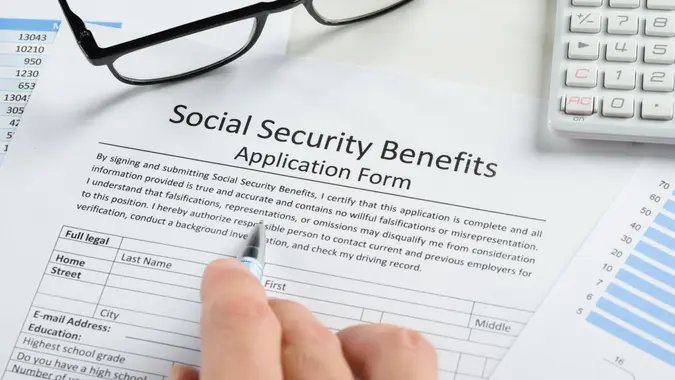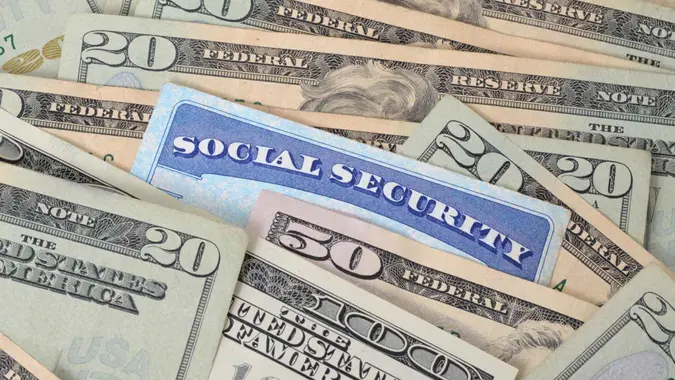6 Things That Happen If You Never Claim Social Security

Commitment to Our Readers
GOBankingRates' editorial team is committed to bringing you unbiased reviews and information. We use data-driven methodologies to evaluate financial products and services - our reviews and ratings are not influenced by advertisers. You can read more about our editorial guidelines and our products and services review methodology.

20 Years
Helping You Live Richer

Reviewed
by Experts

Trusted by
Millions of Readers
According to the Social Security Administration, approximately 3.3% of people 60 years and older never receive Social Security benefits. These so-called “never beneficiaries” include late-arriving immigrants, infrequent workers, non-covered workers and individuals who die before they can receive their benefits.
Some individuals choose not to receive their Social Security benefits either by delaying them or by never claiming them. If you are nearing retirement age, it is important to understand what happens if you opt not to receive your benefits or if you choose to delay them until a later date.
The more information you have, the better decisions you can make as you age. Here are six things that happen if you never claim Social Security benefits.
Also see eight reasons you might not get Social Security.
You Stop Earning Delayed Retirement Credits at 70
You may have heard that you can delay receiving retirement benefits until the age of 70. By delaying benefits, you can actually receive more money each month. For example, for individuals born between 1943 and 1954, full retirement age is 66. If you begin receiving your benefits at that age, you will receive 100% of them. However, if you wait to receive benefits until you are 67, you will receive 108%.
This increase, however, caps at age 70. You will receive 132% of your monthly benefit if you delay receiving it until the age of 70 or older. Beyond that age, you will not receive any increase for delaying the receipt of your benefits. If you suspended your benefits, they will automatically begin again the month you turn 70.
You’ll Receive a Bill for Future Part B Premiums
Before you delay or suspend your benefits, it is important to understand how it might affect other benefits you receive. For example, if you enrolled in Medicare Part B and suspend your retirement benefits, you will be billed for future Part B premiums by the Centers for Medicare & Medicaid Services (CMS). These premiums cannot be deducted from suspended retirement benefits, so you will need to pay them from another account.
It May Make You Ineligible for Supplemental Security Income (SSI) Benefits
Suspending your benefits also will make you ineligible for things like Supplemental Security Income (SSI) benefits. Before you suspend, delay or choose not to claim your benefits, it is important to speak to a financial advisor and a representative from the Social Security Administration to ensure you understand the total impact of the decision.
It is important to remember that you need to enroll in these programs. Most benefits will not start automatically. If you do not want to receive benefits until later, you can choose to suspend or delay them. It may, however, affect other incomes, including supplemental security income.
You Will Leave Money You Earned on the Table
It is important to remember that throughout your career, you pay into Social Security. Unlike a retirement account, you cannot leave the money to another person, although a loved one may qualify for survivor benefits. If the money goes unused, it simply stays in the trust fund to be used by other workers when they retire. Therefore, if you opt not to receive your benefits, you are leaving your hard-earned money on the table.
You Won’t Have as Much Money To Invest
Even if you feel that you have sufficient income during retirement, you still might want to consider taking your Social Security benefits. The SSA notes that “never beneficiaries” have a higher rate of poverty compared to current and future beneficiaries. The monthly benefit also can be invested, allowing them to grow and continue to ensure financial stability for you and your family.
People Who Could Receive Benefits on Your Record Won’t Be Eligible
With the exception of a divorced spouse, anyone who receives benefits on your record will not receive benefits while they are suspended. Additionally, the SSA explains that “any benefits you receive on someone else’s record will also be suspended.”
 Written by
Written by  Edited by
Edited by 
























